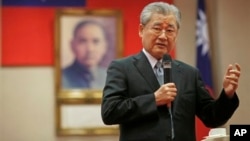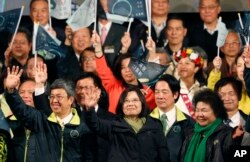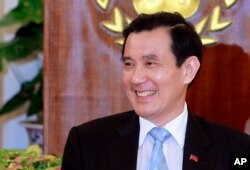Taiwan’s premier has left his post following elections that will bring the chief opposition party into power. That party may put ever tense relations with China on hold. But today’s president and the incoming one are negotiating a deal that could stop a mass resignation of the cabinet.
Taiwan Premier Mao Chi-kuo has taken leave from his job, saying he will not be back. He expressed worry Saturday about his ability to govern after voters elected a president and parliament from the opposition party.
The opposition leaders are expected to take a tougher stance on ties with political rival China and a hobbled cabinet now may be unable to sustain the trust it has built up with Beijing since 2008. The premier also asked his Cabinet to quit, and President Ma Ying-jeou is considering whether to give approval.
Government transition
Mao defended his government’s work on China relations and economic growth in a speech to the Cabinet Monday but acknowledged divergent public opinion.
He said a new public opinion has been formed. In order to respect the new public opinion and safeguard the promotion of future government work, Mao said he has approached the president to request approval of his resignation.
On Saturday, opposition Democratic Progressive Party chairperson Tsai Ing-wen won the presidential election with 56 percent of the vote. That day the premier issued a statement saying that without his resignation, major decisions would be impossible, severely affecting development and people’s happiness.
Analysts believe her victory reflects popular discontent with the current government of eight years. Voters said this month the president has moved too fast in forming economic ties with China, an old rival that claims sovereignty over the self-ruled island. Many in the electorate also believe the Ma administration could have done more to create jobs, raise wages and control housing prices.
But President Ma is holding off on approving the Cabinet resignation. He is talking with the president-elect’s camp about finding government ministers who are agreeable to both sides and could keep their jobs past Tsai’s inauguration in May.
Ma can legally retain his current cabinet, but Taiwanese presidents typically change them to apologize for election losses.
The premier’s temporary replacement said talks with China on a free trade deal would stop if the cabinet resigns. It is unclear how Tsai’s government will negotiate with China. She disputes Beijing’s precondition that both sides can talk only as parts of a single China. The current Taiwan government has accepted that condition since Ma took office in 2008.
However, the president-elect said throughout her campaign she would avoid upsetting China and not try to break away legally to back up the island’s de facto autonomy.






